As Iran and Russia sense they’ve been “had” by President Obama over the Syrian “cease-fire” — and other U.S. deceptions — the prospects rise for a climactic battle in Syria, writes ex-British diplomat Alastair Crooke from Beirut.
By Alastair Crooke
Gradually, the mist of ambiguity and confusion hanging over Syria is lifting a little. The landscape is sharpening into focus. With this improved visibility, we can view a little more clearly the course of action being prepared by Iran, Russia and the Syrian government.
Russia is emerging from an internal debate over whether the U.S. is truly interested in an entente or only in bloodying Russia’s nose. And what do we see? Skepticism. Russia is skeptical that NATO’s new missile shield in Poland and Romania, plus military exercises right up near its border, are purely defensive actions.
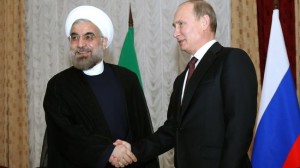
Iranian President Hassan Rouhani (left) shakes hands with Russian President Vladimir Putin at the Shanghai Cooperation Organization summit in the Kyrgyz capital of Bishkek on Sept. 13, 2013. (Photo credit: Press TV)
Iran, meanwhile, is studying the entrails of the nuclear agreement. As one well-informed commentator put it to me, Iran is “coldly lethal” at the gloating in the U.S. at having “put one over” Iran. Because, while Iran has duly taken actions that preclude it from weaponizing its nuclear program, it will not now gain the financial normalization that it had expected under the agreement.
It’s not a question of slow implementation — I’ve heard directly from banks in Europe that they’ve been visited by U.S. Treasury officials and warned in clear terms that any substantive trade cooperation with Iran is closed off. Iran is not being integrated into the financial system.
U.S. sanctions remain in place, the Europeans have been told, and the U.S. will implement fines against those who contravene these sanctions. Financial institutions are fearful, particularly given the size of the fines that have been imposed — almost $9 billion for the French bank BNP a year ago.
In principle, sanctions have been lifted. But in practice, even though its sales of crude are reaching pre-sanctions levels, Iran has found that, financially, it remains substantially hobbled. America apparently achieved a double success: It circumscribed Iran’s nuclear program, and the U.S. Treasury has hollowed out the nuclear agreement’s financial quid pro quo, thus limiting Iran’s potential financial empowerment, which America’s Gulf allies so feared.
Some Iranian leaders feel cheated; some are livid. Others simply opine that the U.S. should never have been trusted in the first place.
The Failed Cease-Fire
And Damascus? It never believed that the recent cease-fire would be a genuine cessation of hostilities, and many ordinary Syrians now concur with their government, seeing it as just another American ruse. They are urging their government to get on with it — to liberate Aleppo.

Video of the Russian SU-24 exploding in flames inside Syrian territory after it was shot down by Turkish air-to-air missiles on Nov. 24, 2015.
“Just do it” is the message for the Syrian government that I’ve heard on the streets. A sense of the West being deceitful is exacerbated by reports of American, German, French and possibly Belgian special forces establishing themselves in northern Syria.
All this infringement of Syrian sovereignty does not really seem temporary but rather the opposite: there are shades of Afghanistan, with all the “temporary” NATO bases. In any case, it is no exaggeration to say that skepticism about Western motives is in the air — especially after Ashton Carter, the U.S. defense secretary, raised the possibility of NATO entering the fray.
As Pat Lang, a former U.S. defense intelligence officer, wrote last week:
“The Russians evidently thought they could make an honest deal with [U.S. Secretary of State John] Kerry [and President] Obama. Well, they were wrong. The U.S. supported jihadis associated with [Jabhat al-Nusra, al Qaeda’s Syria wing] … merely ‘pocketed’ the truce as an opportunity to re-fit, re-supply and re-position forces. The U.S. must have been complicit in this ruse. Perhaps the Russians have learned from this experience.”
Lang goes on to note that during the “truce,” “the Turks, presumably with the agreement of the U.S., brought 6,000 men north out of [Syria via the] Turkish border … They trucked them around, and brought them through Hatay Province in Turkey to be sent back into Aleppo Province and to the city of Aleppo itself.”
Reports in Russian media indicate that Nusra jihadists, who have continued to shell Syrian government forces during the “truce,” are being commanded directly by Turkish military advisers. And meanwhile, the U.S. supplied the opposition with about 3,000 tons of weapons during the cease-fire, according to I.H.S. Jane’s, a security research firm.
Protecting Al Qaeda’s Nusra Front
In brief, the cease-fire has failed. It was not observed. The U.S. made no real effort to separate the moderates from Nusra around Aleppo (as Russian Foreign Minister Sergei Lavrov has affirmed). Instead, the U.S. reportedly sought Nusra’s exemption from any Russian or Syrian attack.
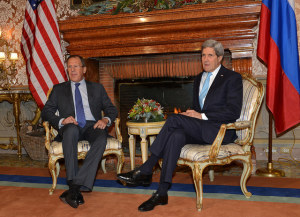
U.S. Secretary of State John Kerry meets with Russian Foreign Minister Sergey Lavrov at the U.S. Ambassador’s residence in Rome, Italy, on Dec. 14, 2014. (State Department photo)
It reminds one of that old joke: “Oh Lord, preserve me from sin — but not just yet!” Or in other words, “preserve us from these dreadful jihadist terrorists, but not just yet, for Nusra is too useful a tool to lose.”
The cease-fire did not hasten any political solution, and Russia’s allies — Iran and Hezbollah — have already paid and will continue to pay a heavy price in terms of casualties for halting their momentum toward Aleppo. The opposition now has renewed vigor — and weapons.
It is hard to see the cease-fire holding value for Moscow much longer. The original Russian intention was to try to compel American cooperation, firstly in the war against jihadism and, more generally, to compel the U.S. and Europe to acknowledge that their own security interests intersect directly with those of Moscow and that this intersection plainly calls for partnership rather than confrontation.
The present situation in Syria neither facilitates this bigger objective nor the secondary one of defeating radical jihadism. Rather, it has led to calls in Russia for a less conciliatory approach to the U.S. and for the Kremlin to acknowledge that far from preparing for partnership, NATO is gearing up for a hybrid war against Russia.
It is also hard to see the cease-fire holding any continuing value for Tehran either. While the Iran nuclear agreement seemed to hold out the promise of bringing Iran back into the global financial system, such expectations seem now to be withering on the vine.
As a result, Iran is likely to feel released from self-imposed limitations of their engagement in Syria and in other parts of the Middle East. Damascus, meanwhile, only very reluctantly agreed to leave its citizens in Aleppo in some semi-frozen limbo. Iran and Hezbollah were equally dubious.
A Hot Summer
All this suggests renewed military escalation this summer. Russian President Vladimir Putin will probably not wish to act before the European summit at the end of June. And neither would he wish Russia to figure largely as an issue in the U.S. presidential election. Yet he cannot ignore the pressures from those within Russia who insist that America is planning a hybrid war for which Russia is unprepared.
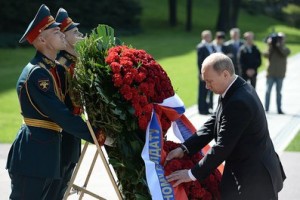
Russian President Vladimir Putin laying a wreath at Russia’s Tomb of the Unknown Soldier on May 8, 2014, as part of the observance of the World War II Victory over Germany.
The Russia commentator Eric Zuesse encapsulated some of these concerns, writing that “actions speak louder than words.” Earlier this month, he notes, the U.S. refused to discuss with Russia its missile defense program:
“Russia’s concern is that, if the ‘Ballistic Missile Defense’ or ‘Anti Ballistic Missile’ system, that the U.S. is now just starting to install on and near Russia’s borders, works, then the U.S. will be able to launch a surprise nuclear attack against Russia, and this system, which has been in development for decades and is technically called the ‘Aegis Ashore Missile Defense System,’ will annihilate the missiles that Russia launches in retaliation, which will then leave the Russian population with no retaliation at all.”
Zuesse goes on to argue that the U.S. seems to be pursuing a new nuclear strategy, one that was put forward in 2006 in a Foreign Affairs article headlined “The Rise of Nuclear Primacy,” and scrapping the earlier policy of “mutually assured destruction.”
The new strategy, Zuesse writes, argues “for a much bolder U.S. strategic policy against Russia, based upon what it argued was America’s technological superiority against Russia’s weaponry — and a possibly limited time-window in which to take advantage of it — before Russia catches up and the opportunity to do so is gone.”
So, what is going on here? Does the U.S. administration not see that pulling Russia into a debilitating Syrian quagmire by playing clever with a cease-fire that allows the insurgency to get the wind back in its sails is almost certain to lead to Russia and Iran increasing their military engagement?
There is talk both in Russia and Iran of the need for a military surge to try to break the back of the conflict. Does the U.S. see that ultimately such a strategy might further entangle it — just as much as Russia and Iran — in the conflict? Does it understand Saudi Arabia’s intent to double down in Syria and Turkish President Recep Tayyip Erdogan’s political interest in continuing the Syrian crisis? Does it judge these very real dangers accurately?
Democrats Act Tough
No, I think not: the political calculus is different. More likely, the explanation relates to the presidential election campaign in the U.S. The Democratic Party, in brief, is striving to steal the Republican Party’s clothes.
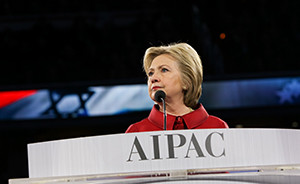
Former Secretary of State Hillary Clinton addressing the AIPAC conference in Washington D.C. on March 21, 2016. (Photo credit: AIPAC)
The latter holds the mantle of being credited as the safer pair of hands of the two, as far as America’s security is concerned. This has been a longstanding potential weakness for the Democrats, only too readily exploited by its electoral opponents. Now, perhaps the opportunity is there to steal this mantle from the Republicans.
All this hawkishness — the American shrug of the shoulders at making Iran feel cheated over the nuclear agreement; at Russia, Iran and Damascus seething that the Syria cease-fire was no more than a clever trap to halt their military momentum; at the psychological impact of NATO exercising on Russia’s borders; at the possible consequences to Obama’s refusal to discuss the ballistic defense system — all this is more likely about showing Democrat toughness and savvy in contrast to Donald Trump.
In short, the Democrats see the opportunity to cast themselves as tough and reliable and to transform foreign policy into an asset rather than their Achilles’ heel. But if all this bullheadedness is nothing more than the Democratic Party espying an apparent weakness in the Trump campaign, is this foreign policy posturing meaningful? The answer is that it is not meaningless; it carries grave risks.
Ostensibly this posture may appear clever in a domestic campaigning context, where Russia is widely viewed in a negative light. But externally, if the Syrian cease-fire comes to be viewed as nothing more than a cynical ploy by the U.S. to drag Russia deeper into the Syrian quagmire in order to cut Putin down to size, then what will likely follow is escalation. Hot months ahead in Syria. Russia will gradually reenter the conflict, and Iran and Iraq will likely increase their involvement as well.
Locking in for War
There are those in the U.S., Turkey and the Gulf who would welcome such a heightened crisis, hoping that it would become so compellingly serious that no incoming U.S. president, of either hue, could avoid the call to do something upon taking office. In this way, the U.S. could find itself dragged into the maw of another unwinnable Middle Eastern war.
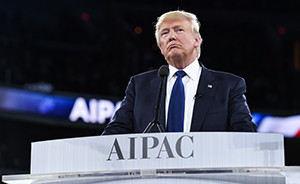
Republican presidential candidate Donald Trump speaking to the AIPAC conference in Washington D.C. on March 21, 2016. (Photo credit: AIPAC)
We should try to understand the wider dangers better, too. Baiting Russia, under the problematic rubric of countering Russian “aggression,” is very much in fashion now. But in Russia, there is an influential and substantial faction that has come to believe that the West is planning a devastating hybrid military and economic war against it.
If this is not so, why is the West so intent on pushing Russia tight up into a corner? Simply to teach it deference? Psychologists warn us against such strategies, and Russia finally is reconfiguring its army (and more hesitantly, its economy) precisely to fight for its corner.
As another noted Russia commentator, John Helmer, noted on his blog on May 30, the new NATO missile installations in Eastern Europe “are hostile acts, just short of casus belli — a cause of war.” According to Reuters, Putin warned that Romania might soon “be in the cross hairs” — the new NATO missile installations there will force Russia “to carry out certain measures to ensure our security.”
“It will be the same case with Poland,” Putin added.
Did you hear that sound? That was the ratchet of war, which has just clicked up a slot — or two.
Alastair Crooke is a former British diplomat who was a senior figure in British intelligence and in European Union diplomacy. He is the founder and director of the Conflicts Forum, which advocates for engagement between political Islam and the West. [This article originally appeared as a blog post at HuffingtonPost, http://www.huffingtonpost.com/alastair-crooke/syria-cease-fire-russia_b_10510126.html ]

It seems that the discussion is abut some kind of contained war, a “proxy” war, that involves Turkey, terrorists, Syria, Russia,
Iran, the Kurds – with the US in the background handing out arms. Is it not possible that one of the participants might
decide to bring the war a little closer to us? We lost, I have heard, 400,000 troops in WWII; the Russians lost 25 million people,
both military personnel and civilians. The Russians – and most of the people in the middle east – know something
we do not know and that is how to look at the repercussions of bombing up close and personal. We do not as yet know that; even Pearl Harbor was not on our mainland and that was 70+ years ago. Many countries in the world are fed up with the havoc and chaos we have left behind in countries where we did not like the governments and/or we want the oil or the pipeline or something. I fear for my country if this military buildup next door to Russia continues and I would like us all to just get along.
I haven’t had time to read this carefully, but there are two things any nation must know about the U.S. First, that it can always be trusted to do what it thinks will benefit itself most, and weaken others most, regardless of what it says. To put the same point in geo-strategic terms, the U.S. is a revolutionary power. It is not interested in any order but one where it is the sole defining force. Period. Power balancing is the only option.
Second, the U.S. is a master at the use of propaganda and psy-ops, and ‘missile shield’ is just another aspect of its psy-ops. There is no missile shield in reality, as many others, including some above, have noted. If you don’t take ABM systems seriously, they lose effectiveness to that same extent, as their only use is as a scare tactic.
Note that soon after the US installed ICBMs in Turkey in the 1960s, the USSR installed ICBMs in Cuba. Would it not be prudent of Russia to install ICBMs in the West? Or nuclear warheads in the US itself, activated by a handy web app. Of course it would teach the US tyrant class nothing, as they do not in fact care about US security. But it would shift the battlefield from Europe and the Mideast to the borders of the US where it belongs, so that the people of the United States would see the problems created by their warmonger tyrants, and throw them out of office. But likely they are too stupid to see that: they will wait until the US is devastated either militarily or economically.
Eric Zuesse, cited in this article, is inaccurate in his description of the capability of Aegis Ashore and confuses it with other ballistic missile defense systems such as THAAD. Aegis Ashore can only be expected to hit short range ballistic missiles, and is dubious against IRBMs and useless against ICBMs. A system like THAAD is meant for ICBMs and is nowhere near operational, and probably never will be, so far only “strapped down chicken” tests have been run. There is no “missle shield” that will “annihilate the missiles that Russia launches in retaliation”, that is a goofy Tom Clancy fantasy. Most importantly, none of these ABM systems are meant to protect civilians(Los Angeles), only to protect military targets, and none have been tested in combat. Ashton Carter has shot his mouth off arrogantly and stupidly, but Mutual Assured Destruction is not obsolete, but REALITY.
It appears U.S. backed Kurdish militias (SDF, YPG, YPJ) are the spearhead to take Raqqa, Deir-ez-zur, and other strategic towns to cut off the Syrian Arab Army and its allies from reaching these key areas first. A liberated Raqqa, for example, would become a bargaining tool for any future peace talks in ending the so-called five year civil war. Denying Syrian re-occupation would also mean the beginning of a ‘balkanization’ campaign of the country into two or more parts. This would further weaken the Assad government and its efforts to reunite the country. In other words, if the Syrian government cannot take back these key cities and towns, they will no longer be in a favourable position to negotiate, but rather accept the terms given by their new masters.
If Mr. Crooke’s arguments in his article are accurate, then the Russian, Iranian, and other Syrian allies must make a decision NOW, whether they want to increase support for the beleaguered Syrian government. This of course will involve other belligerents such as the U.S.,Turkey, French, and British advisers (troops) who are already in Syria and who may find themselves in harm’s way once the bombs start falling on anyone designated a ‘terrorist target.’ The response to Western/NATO/Gulf casualties could greatly increase the chances of a wider war. One the other hand, if there is no response from Russia and Iran, then Syria simply becomes another domino falling to imperialistic ambitions, thus further weakening Iranian and Russian influence in the region.
A question then arises – are Moscow and Tehran prepared to allow Syria to fall, close to their own back yards? Can the U.S. afford another war in the Middle East (South West Asia) with no end goal, and during a U.S. election year? If Moscow and Tehran are serious about Syria’s sovereignty, then they will have no choice but to escalate this conflict. This must be a very difficult decision to weigh. However, with the loss of Syria, it would not be long before Lebanon (Hezbollah) would become the next target to ‘eliminate terrorism.’
The goals of the U.S. and its allies are quite clear:
– break up the Shia Cresent (from Lebanon to Iran)
– deny Iran energy sales (through Iraq and Syria) to Turkey and Europe
-weaken Russia and Iran militarily by destroying a vital ally in the region
– isolating Hezbollah
This has nothing to do with the war on terror. It has everything to do with denying Iran the potential to become a regional power and for the West to profit economically from another failed state.
There are solutions, but the West does not seem interested in talking constructively with Russia (or Iran) about a peaceful solution in Syria. Once upon a time, world leaders from the former Soviet Union and the U.S. would talk to one another about sensitive issues. Even if they did not reach an agreement, at least both sides were communicating. I see no evidence of this today. Rather, a lack of genuine dialogue indicates to me: “Si vis pacem, para bellam.”
Very, very frightening. The USA seems incapable of taking any steps that will allow negotiations in good faith, accepting other nations as genuine partners (there is NO reason for this continuing hatred of Russia, now spread by the media to most of the sheeple). Every interference this century by the USA has been a disaster for the recipients of the “humanitarian actions” and has only benefited the arms dealers and makers and their cronies.
Now I read that John Kerry is taking the side of the 51 “nameless diplomats” who want more regime change in Syria, against Obama, who for this time is standing firm on this point-for how long?
The “cynical ploy by the U.S. to drag Russia deeper into the Syrian quagmire” is only the latest of US gambits to create insurgency quagmires for Russia, like Afghanistan.
1. These wars have damaged US security by antagonizing its alleged allies among insurgencies like Al Qaeda, and have ensured an endless supply of wars.
2. These wars show that wars are the goal of the US tyrant class, its only path to domestic power, as Aristotle warned millennia ago.
3. These quagmires are anti-human because the insurgencies have causes that should have been met otherwise, as in Vietnam etc. They show the US lust to bully and kill instead of promoting health, education, and democracy.
4. The Syria conflict is merely Afghanistan II following the US creation of Al Qaeda there. The USSR consisted largely of such unstable states in central Asia, and it should have been left to its burden of promoting learning and development there.
5. These quagmires also presage the demise of the US, in which it will likely be surrounded by insurgency quagmires throughout its own hemisphere, where it continues to subvert democracies and install dictators.
Robert McNamara (US SecDef in Vietnam era), in “Argument Without End” (1999) concluded that foolish wars like the Vietnam war could be avoided only by “institutionalizing opposition within decision making processes…multiple perspectives need to be discussed openly by both parties” as would be done by the College of Policy Analysis that I often propose as a branch of federal government. Instead the warmongers proved again promptly that war without cause is not an error, it is their purpose, and their sole means to power.
We the people of the USA will never have peace and be safe until the war monger neoCON Zionists are arrested, put on trial, convicted, and put in prison for life.
The ceasefire / negotiations were a farce the second that Jaysh al-Islam (Army of Islam) was not only included but made chief negotiator for the opposition. This was also the group most responsible for the tactical breakdown of the ceasefire and peace negotiations. The Russians should go all in, help the SAA secure Aleppo, and not agree to another ceasefire unless Army of Islam is put in the same category as Al Nusra.
Calling these groups ‘terrorists’ is a semantics game, Al Nusra and Army of Islam, should not be part of Syria’s transitional govt or post civil war elections. Assad and the Kurds yes, them no.